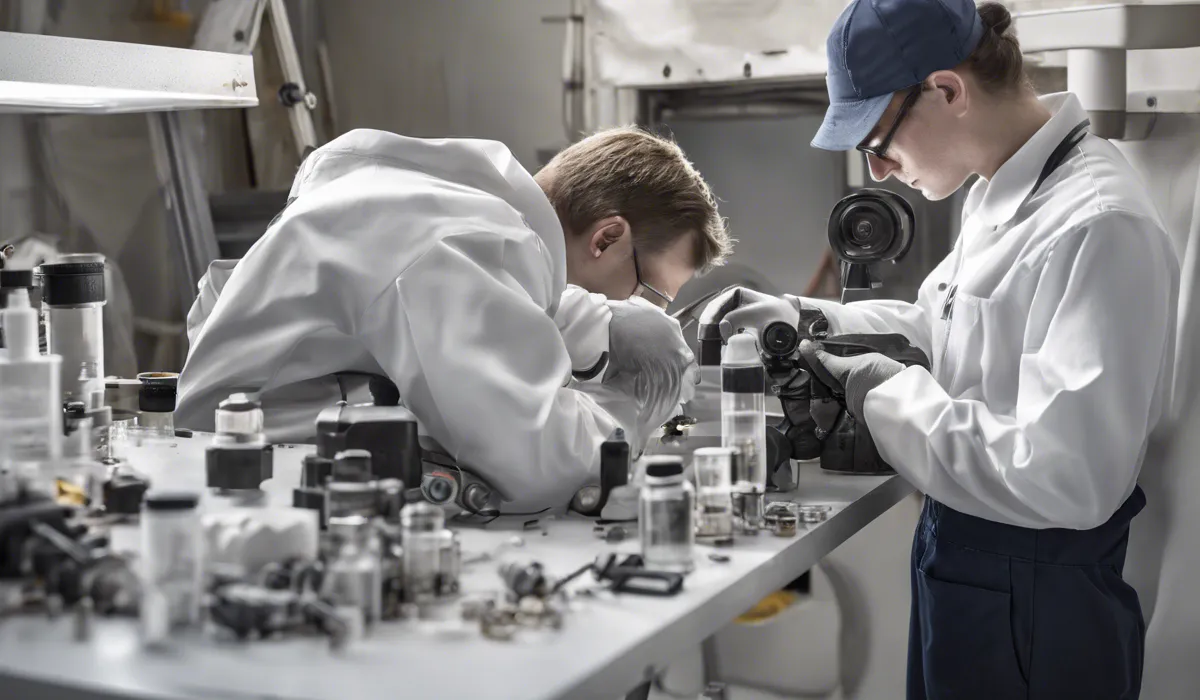To become a mold inspector, research state-specific certifications, complete a training course accredited by professional bodies like NAMRI or IAC2, pass a relevant examination, and obtain necessary licenses. Gain practical experience through apprenticeships or entry-level positions.
Understand the Role of a Mold Inspector

Definition of Mold Inspection
A mold inspector is a professional tasked with the identification and assessment of mold growth within various environments.
This individual conducts thorough examinations of buildings and spaces to detect the presence of mold, assess its extent, and recommend measures for remediation.
Importance of Mold Inspection in Public Health and Property Maintenance
Mold inspection is crucial for public health as exposure to mold can lead to respiratory issues, allergic reactions, and other health concerns.
Additionally, it is essential for maintaining the integrity of properties, as unchecked mold growth can cause significant damage to building structures and surfaces.
Typical Responsibilities and Job Duties
Mold inspectors are responsible for conducting visual inspections, taking samples for laboratory analysis, interpreting results, and preparing detailed reports.
They also provide recommendations for mold remediation and prevention strategies to property owners and managers.
Working Environments and Typical Clients
Mold inspectors work in various settings, including residential homes, commercial buildings, and industrial sites.
Their clients range from homeowners and landlords to businesses and insurance companies seeking to address potential mold-related issues.
Education and Training Requirements

Minimum Educational Qualifications
To become a mold inspector, one must typically have a high school diploma or equivalent. However, some employers may prefer or require post-secondary education in a related field such as environmental science or building construction.
Recommended Courses and Areas of Study
Prospective mold inspectors are encouraged to take courses in biology, chemistry, industrial hygiene, and building sciences.
Understanding the principles of moisture control, ventilation, and building design can greatly enhance an inspector’s ability to diagnose mold issues effectively.
Certification Programs and Accrediting Bodies
Obtaining a certification from reputable accrediting bodies such as the National Association of Mold Remediators and Inspectors (NAMRI) or the International Association of Certified Indoor Air Consultants (IAC2) is essential.
These programs typically involve completing a training course and passing a relevant examination.
Continuing Education Opportunities and Importance
Continuing education is vital for mold inspectors to stay updated on the latest industry standards, technologies, and methods.
Participation in workshops, seminars, and conferences can lead to advanced certifications and enhanced expertise.
Gaining Experience and Building a Career

Entry-level Job Opportunities and Internships
Starting a career as a mold inspector often involves seeking entry-level positions or internships with environmental consulting firms, public health departments, or property inspection companies.
These opportunities provide hands-on experience and can serve as a stepping stone to more advanced roles.
Networking and Professional Associations
Joining professional associations such as NAMRI or IAC2 is an excellent way for mold inspectors to network with peers, access resources, and find mentorship opportunities.
Being part of a professional community can also lead to job referrals and collaborative projects.
Marketing and Business Skills for Independent Inspectors
Independent mold inspectors must possess not only technical skills but also marketing and business acumen to attract and retain clients.
Understanding how to effectively promote services, manage client relationships, and operate a business are key components for success.
Advanced Career Paths and Specialization Opportunities
Experienced mold inspectors may choose to specialize in areas such as forensic mold analysis, industrial hygiene, or even become consultants for legal cases involving mold.
Pursuing these advanced paths can lead to higher earnings, greater recognition, and a more varied career experience.
FAQs About Becoming a Mold Inspector
What certifications are needed to become a mold inspector?
The specific certifications required to become a mold inspector vary by state, but generally, one must complete a training course accredited by professional bodies like the National Association of Mold Remediators and Inspectors (NAMRI) or the International Association of Certified Indoor Air Consultants (IAC2), and pass a relevant examination.
Do mold inspectors require a license?
Yes, in many states, mold inspectors must obtain the necessary licenses to practice professionally, which typically involves meeting education and examination requirements.
How can I gain practical experience as a mold inspector?
Practical experience can be gained through apprenticeships or entry-level positions in mold inspection or related fields, which provide hands-on learning opportunities.
Are there any prerequisites for enrolling in a mold inspector training course?
While prerequisites can vary, most mold inspector training courses require a high school diploma or equivalent as a minimum educational background.
How do I know if a mold inspector training course is accredited?
An accredited mold inspector training course should be recognized by reputable professional bodies such as NAMRI or IAC2. Always verify accreditation status directly with these bodies or through the course provider.
Final Thoughts
Becoming a mold inspector involves state-specific certification research, completing accredited training courses from bodies like NAMRI or IAC2, passing an examination, and securing the necessary licenses.
Practical experience is crucial, which can be gained through apprenticeships or entry-level roles within the industry.
